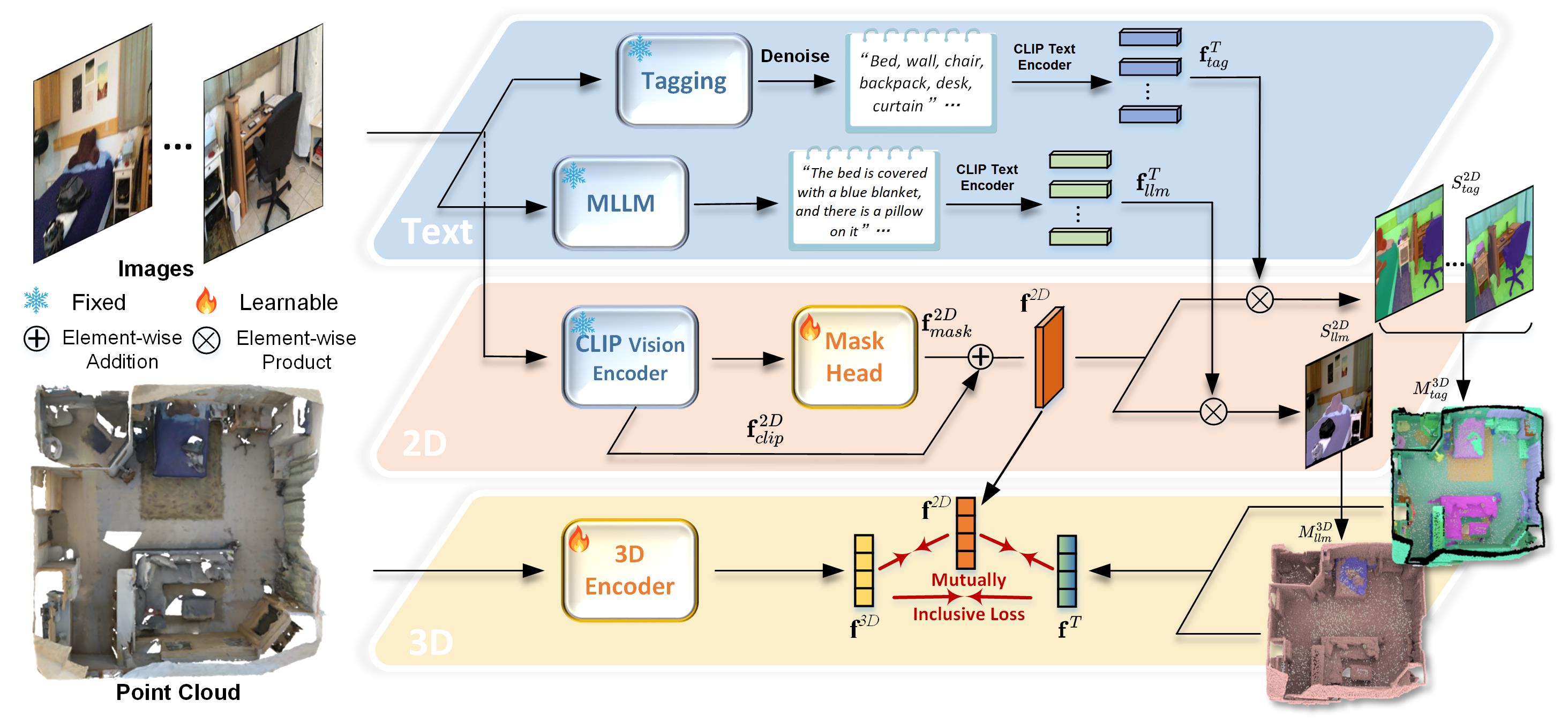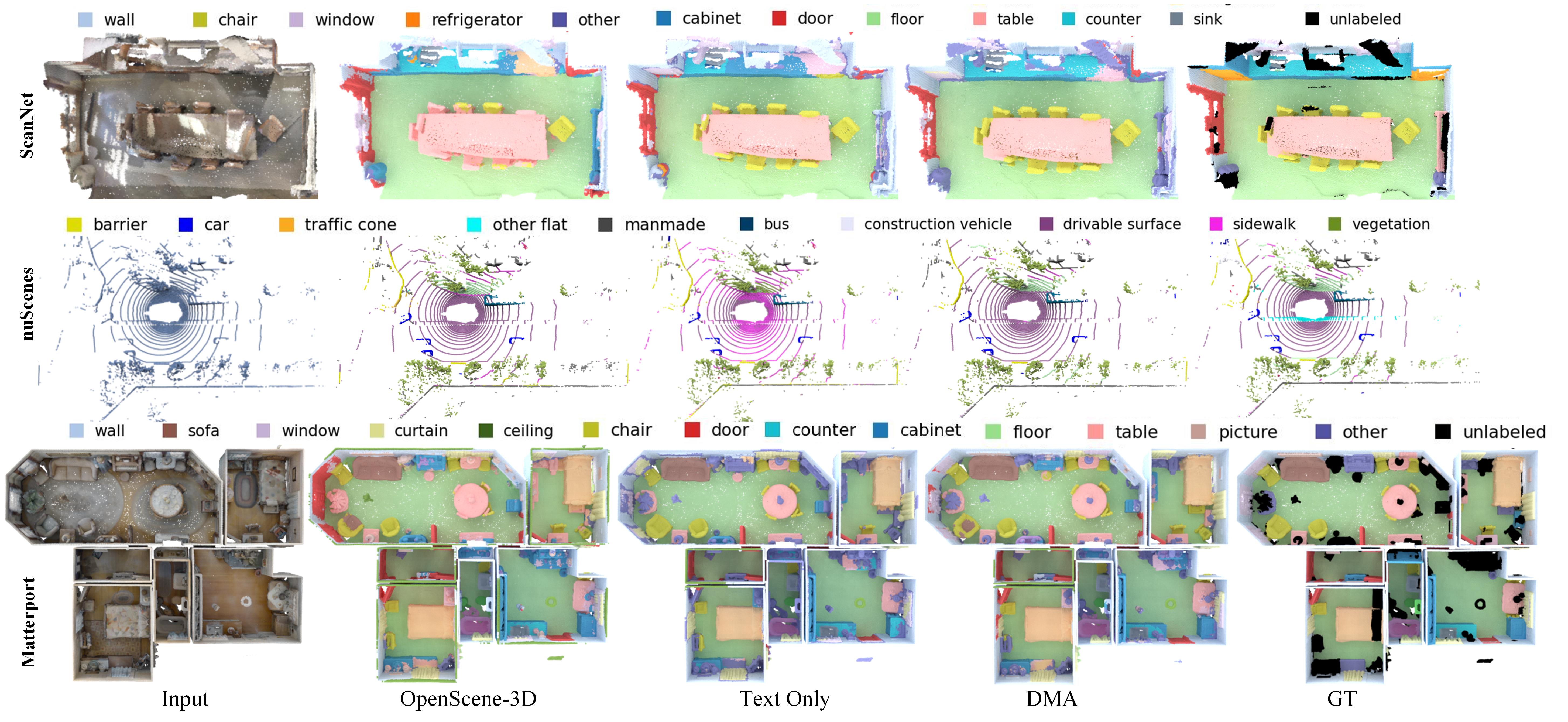This repo is the official implementation of the work DMA.
Recent vision-language pre-training models have exhibited remarkable generalization ability in zero-shot recognition tasks. Previous open-vocabulary 3D scene understanding methods mostly focus on training 3D models using either image or text supervision while neglecting the collective strength of all modalities. In this work, we propose a Dense Multimodal Alignment (DMA) framework to densely co-embed different modalities into a common space for maximizing their synergistic benefits. Instead of extracting coarse view- or region-level text prompts, we leverage large vision-language models to extract complete category information and scalable scene descriptions to build the text modality, and take image modality as the bridge to build dense point-pixel-text associations. Besides, in order to enhance the generalization ability of the 2D model for downstream 3D tasks without compromising the open-vocabulary capability, we employ a dual-path integration approach to combine frozen CLIP visual features and learnable mask features. Extensive experiments show that our DMA method produces highly competitive open-vocabulary segmentation performance on various indoor and outdoor tasks.
- 2024.07.02: DMA is accepted by ECCV 2024!
We expect the folders to be like
└── data
├── data_scannet
│ ├── scannet_2d
│ ├── scannet_3d
│ ├── scannet_200
│ ├── scannet_multiview_openseg
│ └── scannet_multiview_lseg
├── data_nus
│ ├── nuscenes_2d
│ ├── nuscenes_3d
│ ├── nuscenes_multiview_openseg
│ ├── nuscenes_multiview_openseg_val
│ └── nuscenes_multiview_fcclip
├── data_matterport
│ ├── matterport_2d
│ ├── matterport_3d
│ ├── matterport_3d_40
│ ├── matterport_3d_80
│ ├── matterport_3d_160
│ ├── matterport_multiview_openseg
└── └── matterport_multiview_openseg_test
└── output
├── output_scannet
├── output_scannet200
├── output_nuscenes
└── output_matterport
#Scannet
python -u evaluate.py --config=./config/scannet/ours_openseg.yaml feature_type distill save_folder ./save#Scannet200
python -u evaluate.py --config=./config/scannet/ours_openseg_200.yaml feature_type distill save_folder ./save#Scannet200-Head/Common/Tail classes
python -u evaluate.py --config=./config/scannet/ours_openseg_200.yaml feature_type distill save_folder ./save class_split head/common/tail#nuScenes
python -u evaluate.py --config=./config/nuscenes/ours_openseg.yaml feature_type distill save_folder ./save#matterport
python -u evaluate.py --config=./config/matterport/ours_openseg.yaml feature_type distill save_folder ./save#matterport 40/80/160 classes
python -u evaluate.py --config=./config/matterport/test_40/80/160classes.yaml feature_type distill save_folder ./saveIf our work is useful for your research, please consider citing:
@inproceedings{li2024dense,
author = {Ruihuang, Li and Zhengqiang, Zhang and Chenhang, He and Zhiyuan, Ma and Vishal M., Patel and Lei, Zhang},
title = {Dense Multimodal Alignment for Open-Vocabulary 3D Scene Understanding},
booktitle = {ECCV},
year = {2024}
}
This project is based on OpenScene. Thanks for their awesome work.

